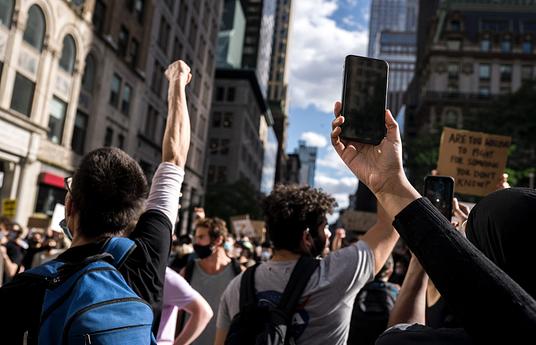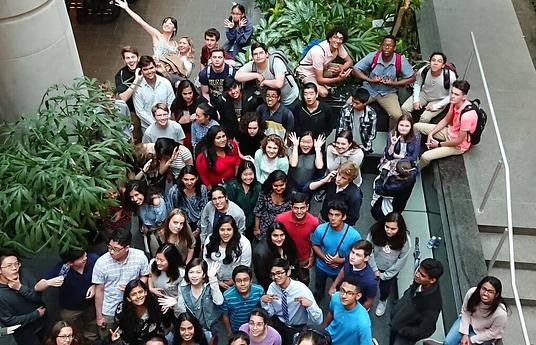"If we want to achieve peace in this world, we will have to start with the children."
The current situation is not only defined by the COVID-19 Pandemic but also by the glaring light shown, yet again, upon one of the other global pandemics we're engulfed by, systemic racism. This moment in our history is defined by these pandemics, and I am still hopeful this might end with successful defiance of them all. COVID-19 highlights how we are equally vulnerable to mortality but obscenely unequal in our abilities to cope and shelter from it. The pandemic of hatred currently expressing itself in its full evil as racist hatred also expresses itself relentlessly around us against women, religions, caste, class, etc. In order to overcome the physical pandemic, we have no choice but to wait for a vaccine to be identified and distributed. As far as the many existential, and societal crises that continue to choke the life out of us - there exists a very easy, cheap, replicable, and scalable simple solution. We actually have that vaccine against racism, gender-based violence religious hatred, etc, we are just not deploying it.
The #thinkequal innovation teaches our children to love and not hate, to love oneself and others regardless of background, gender, colour creed, ethnicity, etc. Its programmatic tools are narrative picture books, which experientially train and practice empathy in our children, prescriptive lesson plans, and accompanying resources that are given to schools and teachers for free. We take neuroscience seriously and literally, we respect its evidence that the critical optimal window of opportunity to build equal, empathetic, respectful, and loving mindsets is prior to the age of 6.
We all too often start too late.
Think Equal is a vaccination of values, a vaccination against discrimination, and violence. Like all other effective vaccinations, it has been designed by experts in the field (of social and emotional intelligence in this case) and is meted out in a set and continuous number of doses, 3 a week over a full 30-week pre-school year. There are 3 age-appropriate levels - even just one would be enough to transform mindsets in the early developing brain from anti-social to pro-social.
Nelson Mandela once said, "education is the most powerful weapon we have to change the world." The key question is what kind of education? Not the broken system we have which was designed in and for the Industrial Revolution and is not fit for purpose, but the missing third dimension to education; social and emotional learning which educates our children's hearts, not only their heads, which teaches them to love and value each and every human being equally, respect our common home the earth, and to lead healthy relationships.
Unfortunately we have not, as a world, until very recently, valued early childhood education as the critical, key foundational stage, and gateway to a life with positive outcomes, which it is. As a result, we have under-trained, undervalued, and underpaid our early years practitioners. In the US the top 25 hedge fund managers are paid more than all the kindergarten teachers in the US put together.
Can we then be surprised that racism is systemic and rife, passed down generationally and cyclically by parents to their children when there is no attempt at disruption by those who hold the duty of educating new generations? Einstein's Theory of Insanity describes just this point: doing the same thing over and over again and expecting a different result. We have all been negligent in our duty to care for our children. It would take decades now to develop a fully trained and capacitated Early Years workforce. We don't have the luxury of decades. Think Equal therefore works prescriptively. We ask teachers who are trained, talented and confident in their Social and Emotional Learning (SEL) expertise, to be patient with our 'spelling things out' to the degree we do in our lesson plans, but it's the only way we can mediate the critical foundational skills evenly to every single child.
When the lesson plans are step by step instructions it means all practitioners around the globe can evenly disseminate the learning as one consistent 'army for good', with one mission - the well being of our children and the peace, safety, equality, and prosperity of our common home, the earth. Far from feeling patronised, teachers from all walks of life and all manner of training, backgrounds, talents, and skill sets, have told us that they appreciate this methodology from every point of view. It gives them a firm base of ready, curated materials and best practice tools to 'plugin and play'. The programmatic tools have been gathered from Yale's Center for Emotional Intelligence's RULER Programme, Wisconsin Maddison's Institute for Healthy Minds' Kindness Curriculum, Emory University's SEE Curriculum, etc. and also sensitively and brilliantly created by experts in the field for the Think Equal Programme. Teachers are given a free narrative picture book written by Sir Ken Robinson for example, created specifically for Think Equal to teach global citizenship, upholding the SDG's and learning to love our earth, teachers are relieved and excited to use it and its accompanying activities and lesson plans in their classroom.
That way teachers know that no matter how short on time they might be, and no matter what the vagaries of the day throw at them, they have excellent resources to rely upon. These resources enable them to systematically, comprehensively, and repeatedly teach social and emotional competencies and skills to their children and witness their transformations and development into responsible global citizens.
It is simple, easy, extremely cheap, replicable, and scalable. First, start by experientially teaching a new generation the following 25 competencies and skills, through concrete and tangible programmatic tools and narrative picture books:
Empathy, self-confidence, emotional literacy, emotion regulation, gender equality, mindfulness, critical thinking, problem-solving, kindness, global citizenship, inclusion, relationship building skills, communication, self-esteem, goal-setting, perspective-taking, being an advocate for others, environmental awareness, collaboration, resilience, celebration of diversity, and creativity.
The programmes to achieve this exist, and there is at least one such programme in a fully comprehensive form to transform our children into loving global citizens within a year, and evidence exists that this experiential learning will produce a lifetime of positive outcomes. All we have to do is implement this programme. It costs the same to pay for the incarceration of one violent offender in South Africa, as it does to teach the Think Equal programme to 5,100 children for a year. Why are we not implementing this in all our early years' settings?
There is ample evidence that quality SEL in a child's early years has significant implications for that child's adult life, including behaviours, attitudes, mental, and even physical health.
We have all the understanding, measurement, and evidence we need. We even have the tools and the programmes we need to implement changes with active, tangible, universally impactful, and prescriptive steps. What we need is to spend more time supporting the teachers in this new learning and encouraging parents to support this learning as best they can at home. Think Equal now has a home-based learning supplementary programme for parents, which we created in response to the COVID-19 pandemic, including a new book we have created to explain the pandemic to young children, written with the help of the WHO. The program also includes the book Me, Myself, and I a book centered around individuality and self-confidence, noting that we are all different and we are all special. The activities include discussions about unique physical characteristics and abilities, skin colours, and how we are all special and unique.
You can find out more about Think Equal and access their free home kits, which include books and activities here
If you have any feedback for us on how we could do better or if you have an innovation to share focused on social justice and racial equality please email our Head of Media, Mariah O’Mara at mariahomara@hundred.org.




